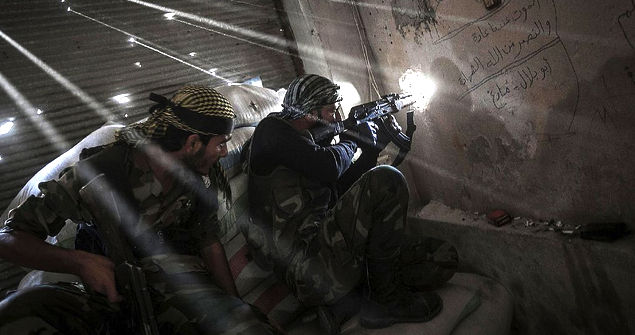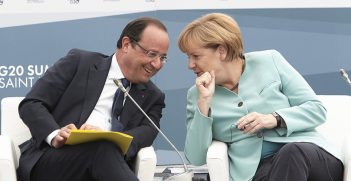The Long Search for Peace in Syria

Is peace possible, or a hopeless dream?
It was reported this week that the UN’s Special Envoy for Syria, Stefan di Mistura, has started to prepare the ground for renewed efforts to find a political solution to the crisis there, following a request by UN Secretary-General, Ban Ki-moon.
If there is a “problem from hell” today, it is surely that of Syria’s civil war. According to the UN, more than 220,000 people have been killed, including 76,000 in 2014. Around 11 million people have been displaced by the war, including around 4 million people who have been forced to flee the country and now seek refuge in Turkey, Jordan and beyond. The sheer horror and apparent hopelessness of Syria’s situation is exemplified by the fate of Palestinian refugees in Yarmouk, near Damascus. Trapped between the lethal and indiscriminate barrel bombs of the Syria’s Assad regime and the beheadings and other atrocities of the so-called “Islamic State”, they are beyond the reach of the international humanitarian community.
Thus far, the parties have shown little interest in negotiating a resolution to the crisis and have proven themselves adept at confounding some of the world’s leading mediators. In 2012, Kofi Annan – whose recent credentials include helping resolve post-election violence in Kenya in 2007-8 – persuaded the parties to adopt a communiqué detailing a road map to a comprehensive settlement. They agreed to a durable ceasefire overseen by UN monitors. But the ceasefire was violated by all sides and never took hold. When the monitors were withdrawn, Annan asked the Security Council to ensure that those who reneged on their commitments faced consequences for doing so. When Russia and China vetoed a resolution threatening to impose sanctions on the Syrian government in the event of further non-compliance, Annan resigned.
His successor, Lakhdar Brahimi, fared even worse. The US refused to countenance Iran’s participation in the talks, despite the fact that almost everyone else, including the UN Secretary-General, saw this as absolutely necessary. Then, Syria’s fragmented opposition proved unable to piece together a credible negotiating team. And finally, as if to cover that uncomfortable fact, the opposition refused to negotiate with the government unless Assad stepped aside. Meanwhile, on the ground government forces – with the help of Hezbollah –retook some ground, making Assad less open to compromise.
The portents for a negotiated settlement are little better now, but that should not stop the UN and its partners from trying. The situation in Syria and the wider region has changed in some important ways. Most obviously, the situation on the ground has changed dramatically as a result of the rise of IS. The government, the Free Syrian Army, the Kurds and even the Islamist radical al-Nusra front have lost ground to IS. Each of these parties is threatened by Islamic State (IS) and its radical ideology. As such, they have some common ground from which to negotiate – a common interest in the defeat of IS and establishment of a stable state free of this particular brand of Islamist radicalism. At the same time, the Syrian government has lost ground recently and may therefore be more willing to negotiate. But the opposition is even more fragmented than in 2012 and this will prove to be one of the most significant challenges for diplomats.
The regional situation has also changed somewhat. Most significantly, the proposed US-Iranian nuclear deal and the role of the Iranian-backed Shiite militia in supporting the Iraqi government against IS has reduced tensions between those two countries and opened space for cooperation. Since the Assad government will only make concessions if its legitimate concerns about the safety and security of those populations that support it are met, Iran’s participation in negotiations is critical and these developments make that more likely. One complicating factor in all this is the recent Saudi-led intervention in Yemen directed against the Iranian-backed Houthi rebels who support former President Saleh. As the ICRC and Australia have recently argued, an immediate ceasefire in Yemen is imperative in order both to end the apparently indiscriminate killing of civilians by both sides and facilitate humanitarian relief and to reduce the escalation of tensions that could undermine peace efforts for Syria.
Thus, even if they can get off the ground – which is by no means a foregone conclusion – negotiations will be long, complex and confronted by myriad obstacles, any one of which could derail the whole process. In the meantime, Syria’s civilians will continue to be killed, injured, abused and displaced in large numbers. In addition to negotiations, therefore, the international community needs to redouble its practical efforts to protect civilians.
It is important to avoid the temptation of thinking that nothing has been done by the international community to aid Syria. Besides fostering peace talks, deploying monitors and pressing the parties to resolve their differences peacefully, the world community has marshaled a huge humanitarian response, has condemned the killing and abuse of civilians and has disarmed Syria’s chemical weapons. Indeed, in 2014 the UN Security Council resolved that humanitarian aid could be delivered across Syria’s border without the government’s consent. An initiative led in part by Australia, this was the first time in its history that the Council has taken this step.
But as the harrowing scenes from Yarmouk show, much more needs to be done to protect civilians whilst the diplomats talk. There are at least five urgent priorities.
First, the international community should ensure that the humanitarian relief effort is fully resourced and that pledges of financial support are fulfilled in a timely fashion.
Second, individual states should provide additional assistance to the UN High Commissioner for Refugees and states neighboring Syria by significantly increasing their intake of refugees from Syria.
Third, the UN Security Council and other relevant actors should consider adopting measures to ensure better humanitarian access to civilians within Syria, making access to Yarmouk an urgent priority.
Fourth, the UN Security Council needs to send a strong signal to all armed groups that genocide, war crimes, ethnic cleansing and crimes against humanity are utterly unacceptable. The best way to do this, and to break the cycle of impunity in Syria, is for the Council to refer the situation in Syria to the International Criminal Court.
Fifth, the international community should stop pouring fuel on the fire by supplying the parties with arms and ammunition. Negotiations will never deliver peace whilst the parties think they can fight their way to victory or, at least, a better deal. The UN Security Council should impose, and rigorously enforce, an embargo on arms and ammunition flowing into Syria.
These measures are only stopgaps and even they will be difficult to negotiate and more difficult still to implement. If nothing else, though, the international community needs to set aside its sense of resignation that nothing can be done to help Syria’s people and revitalize efforts on a number of fronts. Better to try and fail, than not to try at all.
Alex J. Bellamy is Director of the Asia Pacific Centre for the Responsibility to Protect and Professor of Peace and Conflict Studies at The University of Queensland, Australia. This article can be republished with attribution under a Creative Commons Licence.





